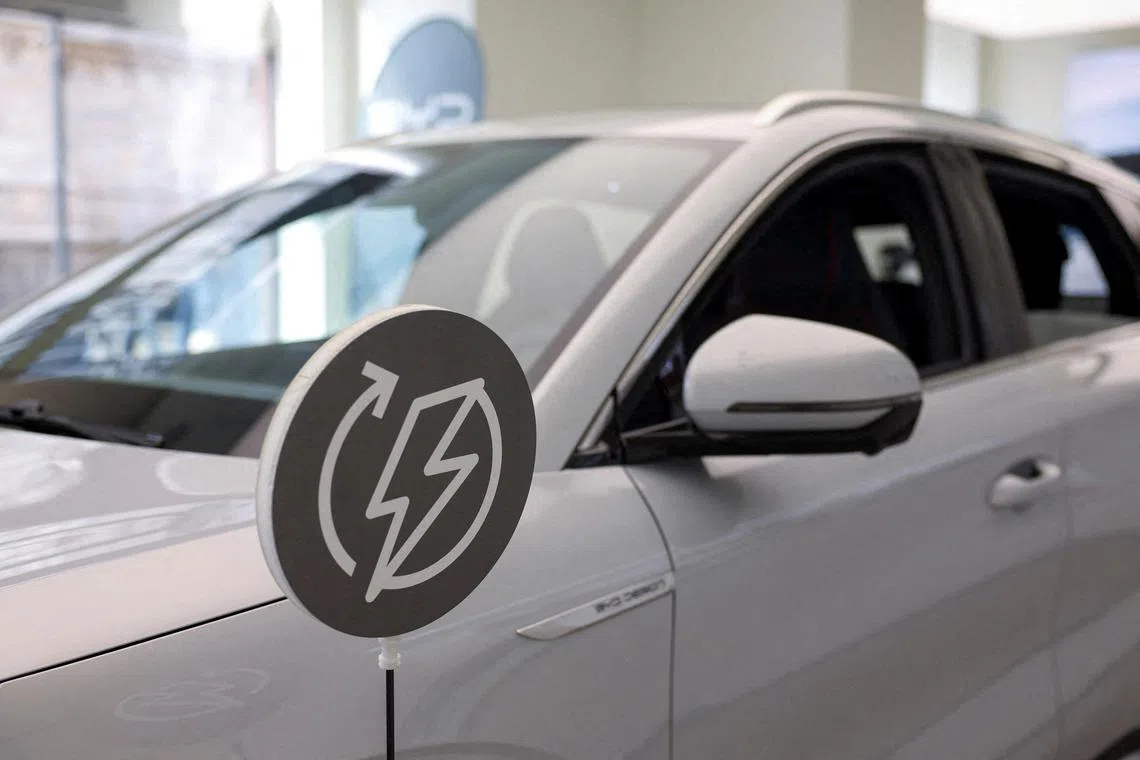Canada prepares potential tariffs on Chinese EVs after US and EU moves
Sign up now: Get ST's newsletters delivered to your inbox

The value of Chinese EVs imported by Canada surged to C$2.2 billion in 2023, from less than C$100 million in 2022.
PHOTO: REUTERS
Ottawa - Prime Minister Justin Trudeau’s government is preparing potential new tariffs on Chinese-made electric vehicles (EVs) to align Canada with actions taken by the United States and European Union,
The government still has to make the final decision on how to proceed, but it is likely to announce soon the start of public consultations on tariffs that would hit Chinese exports of EVs into Canada, according to officials who spoke on condition they not be identified.
Mr Trudeau has been under increasing pressure at home and abroad to follow the lead of US President Joe Biden’s administration, which announced in May a plan to nearly quadruple tariffs on Chinese-manufactured EVs, up to a final rate of 102.5 per cent.
The European Union said last week it plans to increase tariffs on Chinese EVs, taking those levies to as high as 48 per cent on some vehicles.
Western democracies are increasingly concerned about China’s overproduction of key goods, seeing it as an effort to dominate supply chains and undercut their own industries. Battery-powered EVs have become a major target as Chinese companies such as BYD move aggressively into global markets.
On June 20, Ontario Premier Doug Ford accused China of taking advantage of low labour standards and dirty energy to make inexpensive EVs. He called on Mr Trudeau’s government to at least match the Biden tariffs.
“Unless we act fast, we risk Ontario and Canadian jobs,” he said on the social media platform X.
The value of Chinese EVs imported by Canada surged to C$2.2 billion (S$2.18 billion) in 2023, from less than C$100 million in 2022, according to data from Statistics Canada.
The number of cars arriving from China at the port of Vancouver jumped more than fivefold after Tesla started shipping Model Y vehicles there from its Shanghai factory.
However, the Canadian government’s concern is not Tesla, but the prospect of cheap cars made by Chinese automakers eventually flooding the market.
Publicly, Mr Trudeau and his Cabinet ministers have said they are monitoring what other countries are doing but have not committed to new tariffs. The Prime Minister told reporters on June 20 that he had “significant conversations” about Chinese production at the Group of Seven leaders’ summit in Italy last week.
A spokesperson for Finance Minister Chrystia Freeland said Canada is “actively considering next steps to counter Chinese oversupply” but did not address if tariffs are being prepared.
Canadian auto industry groups have called on Canada to impose stiff tariffs. They warned that Canada cannot afford to be unaligned with the US on this issue, given the upcoming review of the United States-Mexico-Canada free trade agreement.
The US and Canada have tightly integrated auto supply chains, with parts and finished vehicles flowing across the border in huge quantities. The vast majority of Canada’s auto production is exported to the US.
However, Mr Trudeau has moved carefully, given the possibility of Chinese trade retaliation. Some environmental groups argue that it is most important to keep EV costs low to encourage higher consumer adoption.
Mr Trudeau’s administration and Mr Ford’s government in Ontario have promised to pour billions into building a domestic industry for EV manufacturing, from mining critical minerals for batteries all the way to assembling cars and light trucks.
That includes multibillion-dollar subsidies for major new factories for Volkswagen, Stellantis and Honda Motor. BLOOMBERG


